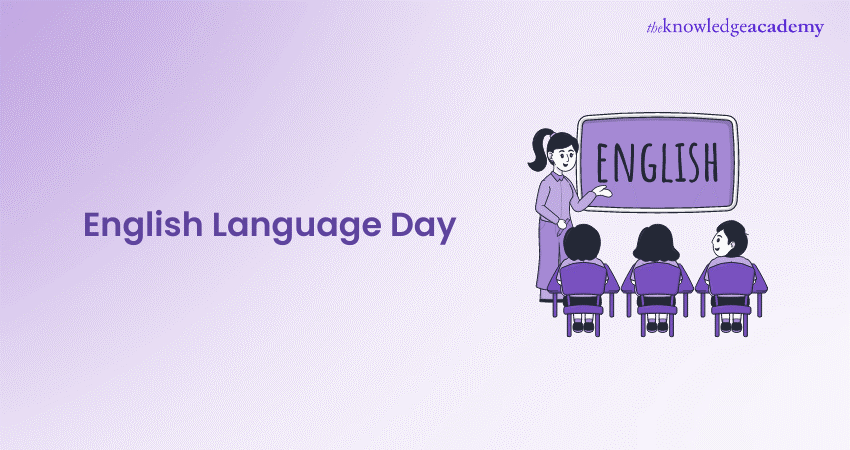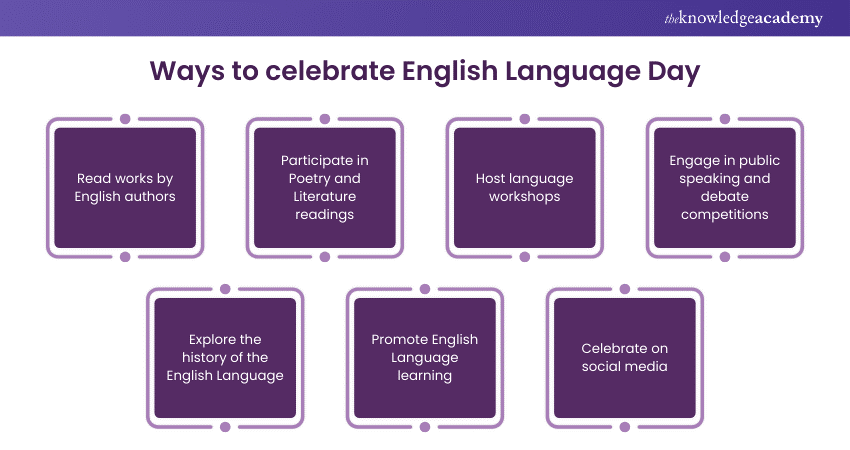We may not have the course you’re looking for. If you enquire or give us a call on + 1-866 272 8822 and speak to our training experts, we may still be able to help with your training requirements.
Training Outcomes Within Your Budget!
We ensure quality, budget-alignment, and timely delivery by our expert instructors.

English is global language. It binds people from numerous cultures together; they get to share their ideas, opinions and even gossips clearly by using this language. To honour the beauty of English and historical figures associated with this language, United Nations has officially marked English Language Day on April 23rd.
This day represents the association with the Shakespearean figure, whom writers and scholars name as one of the best writers of the English language. However, celebration of English Language Day takes many forms. Want to know how? Read this blog to learn more!
Table of Contents
1) What is English Language Day?
2) History of English Language Day
3) Ways to celebrate English Language Day
4) Key facts about English Language Day
5) Conclusion
What is English Language Day?
English Language Day is celebrated every year on the 23rd of April to commemorate the English Language's multi-coloured history and its tremendous role in uniting people worldwide. This day, by consensus in the UN, came to compliment William Shakespeare's birthday (an influential figure in English Literature), and therefore, it was decided to link both occasions together. The event praises the study and appreciation of the English language, abets linguistic diversity, and tries to elevate the awareness of the English language's cultural heritage worldwide.
History of English Language Day
The English Language Day, established by the United Nations Educational, Scientific and Cultural Organization (UNESCO), is one of the efforts to appreciate the pivotal role of the English language in facilitating global communications, education and cultural heritage. April 23, which coincides with William Shakespeare's birthday, as the origin for World English Day is a double-fold celebration.
It not only showcases the immense contribution of the Bard to Anglo-Saxon Literature, but the day also points out the development of English as a language. It has emerged from being a regional dialect into a standard means of communication and interaction across the world.
This celebration is part of the UN initiative to designate all six official languages for cultural diversification and multilingualism worldwide to be promoted. English Language Day is a chance to celebrate the history behind this language, which has become very diverse and even unifies all people into one family based on global understanding and cooperation.
Unlock your English proficiency with our comprehensive TOEFL Training today!
Ways to celebrate English Language Day
English Language Day celebration consists of a host of events and programs that contribute to showcasing the broadness and reserves of the English language. Some of the ways include the following:

a) Read works by English authors: While studying English in class, you can familiarise yourself with the classics of English Literature or explore contemporary English writers as well.
b) Participate in Poetry and Literature readings: Be part of or host a festival to support English Literature.
c) Host language workshops: Workshops on creative writing, grammar, and pronunciation can be informative, entertaining, and a lot of fun.
d) Engage in public speaking and debate competitions: Make English more vivid and attractive.
e) Explore the history of the English Language: Discover the history that brought it about, its development, and worldwide influence from viewing documentaries or lectures.
f) Promote English Language learning: Volunteer to teach English or become a tutor in the language exchange meetups.
g) Celebrate on social media: Sharing English quotes, poems, or facts in tagged posts would be an attempt to join the ongoing global discussion.
Enhance your knowledge on tenses and prepositions with our course on English Grammar Course – register now!
Key facts about English Language Day
Here are some interesting facts that you need to know on English Language Day:
a) Origins of English:
1) The history of English may be traced back to the 5th century, when the Germanic tribes invaded Britain and spoke their languages, interacting with the Celtic-speaking people of the land.
2) The Scandinavians settled among others there, including the Danes, Swedes, and Norwegians, who also contributed their linguistic heritage.
3) William I of France became King of England in 1066 following his coronation. Henceforth, Norman French became the language of chivalry, contrivance, and formal entities.
4) French has crept into the very root system of English, giving rise to approximately half of the total number of words.
b) Shakespeare’s impact:
1) William Shakespeare, who was fueled by admiration from all generations, played a more significant role in defining the English language.
2) His birth and death are thought to have occurred on April 23rd. Thus, he was a man of amazing literary power in the 16th and 17th centuries.
3) Shakespeare introduced hundreds of words and phrases that are still in use today.
4) Phrases such as “break the ice,” “our olden days,” “faint-hearted,” and “love is blind” were used from his era.
c) English’s global spread:
1) The ground spreading of the English language has a complicated background, which shows the epoch of colonialism and migration.
2) Europeans, comprised of England and others, extended their empires as they sometimes took over others.
3) Prior to the mid-twentieth century, colonies that were formerly controlled by the British Empire gained independence; however, the English language remained strongly dominant.
4) Writers from Africa, the Caribbean, and Asia started writing in English and using their stories to address the dominating issues of oppression, injustice, and identity.
d) World Englishes:
1) The varying species of English, which were influenced by dispersion peopling and colonisation, are referred to as the World Englishes.
2) England is one of the most spoken languages globally. Every quarter, the number one person communicates effectively in English.
3) It functions as a bridge, linking the cultural realms, encouraging communication, and furthering collaboration across the world.
Conclusion
English Language Day serves as a reminder of the language's vast influence and its role in bridging cultural and linguistic gaps across the globe. It's a day to celebrate the diversity and history of English, to appreciate its contributions to world literature, and to encourage its learning and use as a means of global communication.
Learn the important skills of speaking confidently in public with our Public Speaking Course – sign up now!
Frequently Asked Questions

The Knowledge Academy takes global learning to new heights, offering over 30,000 online courses across 490+ locations in 220 countries. This expansive reach ensures accessibility and convenience for learners worldwide.
Alongside our diverse Online Course Catalogue, encompassing 17 major categories, we go the extra mile by providing a plethora of free educational Online Resources like News updates, Blogs, videos, webinars, and interview questions. Tailoring learning experiences further, professionals can maximise value with customisable Course Bundles of TKA.

The Knowledge Academy’s Knowledge Pass, a prepaid voucher, adds another layer of flexibility, allowing course bookings over a 12-month period. Join us on a journey where education knows no bounds.

The Knowledge Academy offers various Project Management Courses, including Certified Digital Services Project Manager Course, Certified Global Project Manager Training, and Project Management Office Fundamentals Certification Course. These courses cater to different skill levels, providing comprehensive insights into Project Management methodologies.
Our Project Management blogs cover a range of topics related to PRINCE2, offering valuable resources, best practices, and industry insights. Whether you are a beginner or looking to advance your Project Management skills, The Knowledge Academy's diverse courses and informative blogs have you covered.
Upcoming Business Skills Resources Batches & Dates
Date
 English Speaking Course
English Speaking Course
Fri 19th Jul 2024
Fri 1st Nov 2024









 Top Rated Course
Top Rated Course



 If you wish to make any changes to your course, please
If you wish to make any changes to your course, please


